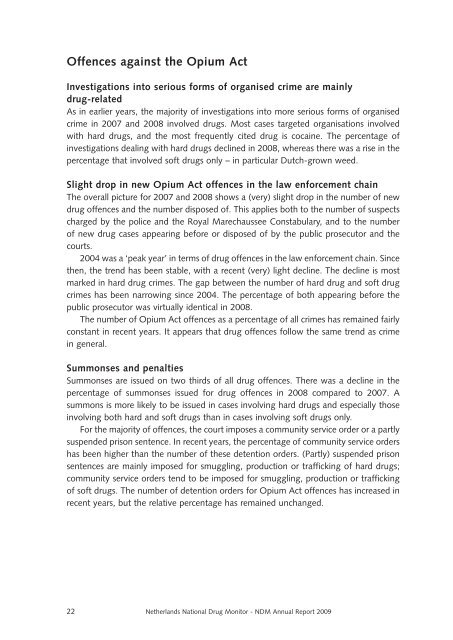- Page 1 and 2: Netherlands National Drug Monitor N
- Page 3 and 4: Colophon Project Manager Dr. M.W. v
- Page 6: Preface This is already the tenth A
- Page 9 and 10: 5.4 Problem Use 113 5.5 Usage: Inte
- Page 12 and 13: List of abreviations and acronyms 2
- Page 14 and 15: NEMESIS NFU NIGZ NMG NPO NRI NVIC N
- Page 16 and 17: Summary Below is an outline of the
- Page 18 and 19: The number of hospital admissions c
- Page 20 and 21: GHB. In 2008/2009 4.6 percent of fr
- Page 24 and 25: Offences by drug users Drug users c
- Page 26 and 27: Opiates Ecstasy Amphetamine Alcohol
- Page 28 and 29: 1 Introduction The National Drug Mo
- Page 30 and 31: use, particularly cannabis, under-r
- Page 32 and 33: information is available, this is b
- Page 34 and 35: 2 Cannabis Cannabis (Cannabis Sativ
- Page 36 and 37: Figure 2.1 Cannabis users in the Ne
- Page 38 and 39: Figure 2.2 Cannabis use among secon
- Page 40 and 41: Cannabis and problem behaviour •
- Page 42 and 43: Table 2.4 Cannabis use among pupils
- Page 44 and 45: Table 2.5 Current cannabis use in s
- Page 46 and 47: • The sharp increase in treatment
- Page 48 and 49: Trends It is difficult to determine
- Page 50 and 51: • The role of cannabis in all req
- Page 52 and 53: - misuse or dependence on alcohol a
- Page 54 and 55: At the Ambulance Transport Centre (
- Page 56 and 57: • So far, epidemiological studies
- Page 58 and 59: Quality and price The Trimbos Insti
- Page 60 and 61: 3 Cocaine Cocaine works as a stimul
- Page 62 and 63: Age, gender and urbanisation level
- Page 64 and 65: Special groups In certain groups of
- Page 66 and 67: Table 3.3 Cocaine use in special gr
- Page 68 and 69: and 7.7% in the U.K (England and Wa
- Page 70 and 71: Table 3.5 Cocaine use among school-
- Page 72 and 73:
Figure 3.2 Number of (outpatient) a
- Page 74 and 75:
Figure 3.4 Admissions to general ho
- Page 76 and 77:
The Netherlands Cause-of-Death stat
- Page 78:
• Little is known as yet about a
- Page 81 and 82:
4.2 Usage: general population Heroi
- Page 83 and 84:
• In the province of Gelderland,
- Page 85 and 86:
Figure 4.1 Estimates of the number
- Page 87 and 88:
and syringes exchanged has been reg
- Page 89 and 90:
• Between 2001 and 2004 the numbe
- Page 91 and 92:
- misuse of or dependence on alcoho
- Page 93 and 94:
same time it should be noted that t
- Page 95 and 96:
International comparison The Europe
- Page 97 and 98:
The total number of chronic hepatit
- Page 99 and 100:
• It is thought that risk behavio
- Page 101 and 102:
the ICD-9 classification. Drug deat
- Page 103 and 104:
Amsterdam GGD Amsterdam reports the
- Page 105 and 106:
Figure 4.9 Number of drug-induced d
- Page 107 and 108:
• Pupils attending REC-4 schools
- Page 109 and 110:
5.3 Usage: juveniles and young adul
- Page 111 and 112:
• In 2008, key observers in Amste
- Page 113 and 114:
Table 5.3 Use of Ecstasy and amphet
- Page 115 and 116:
Table 5.4a Use of amphetamines and
- Page 117 and 118:
Table 5.5a Ecstasy use among school
- Page 119 and 120:
Ecstasy • The number of (outpatie
- Page 121 and 122:
Figure 5.3 Numbers registered with
- Page 123 and 124:
• The same person may be admitted
- Page 125 and 126:
• The number of requests for info
- Page 127 and 128:
According to the EMCDDA, in other E
- Page 129 and 130:
Figure 5.6 Concentration of MDMA in
- Page 131 and 132:
Table 5.9 Number of samples contain
- Page 133 and 134:
• Consumers who had drug samples
- Page 135 and 136:
6.2 Usage: general population The r
- Page 137 and 138:
GHB use is more common among juveni
- Page 139 and 140:
• GHB use among school-goers is l
- Page 141 and 142:
Table 6.4 GHB incidents registered
- Page 143 and 144:
• Of the liquid samples sold as G
- Page 145 and 146:
• Total deaths from alcohol-relat
- Page 147 and 148:
Figure 7.1 Alcohol consumption amon
- Page 149 and 150:
Ethnic background • Among seconda
- Page 151 and 152:
Table 7.3 Percentage of current dri
- Page 153 and 154:
Table 7.4 Alcohol use in the social
- Page 155 and 156:
Holiday-makers • Research conduct
- Page 157 and 158:
Figure 7.3 Heavy drinkers by gender
- Page 159 and 160:
The countries with the lowest perce
- Page 161 and 162:
• In France it is more likely tha
- Page 163 and 164:
Figure 7.6 Age distribution of prim
- Page 165 and 166:
• In 2008, 337 day-care admission
- Page 167 and 168:
• In approximately 1,200 admissio
- Page 169 and 170:
Table 7.9 Estimated number of injur
- Page 171 and 172:
• On the basis of current researc
- Page 173 and 174:
Figure 7.10 Deaths from alcohol use
- Page 175 and 176:
• EU member states have different
- Page 177 and 178:
• Surveys by the Continuous Surve
- Page 179 and 180:
Figure 8.1 Percentage of smokers in
- Page 181 and 182:
8.3 Usage: juveniles and young adul
- Page 183 and 184:
Special education Table 8.3 shows t
- Page 185 and 186:
Table 8.4 Smokers in the EU-15 plus
- Page 187 and 188:
medication, Champix ® , which was
- Page 189 and 190:
among passive smoking men, the elev
- Page 191 and 192:
Table 8.6 Deaths from lung cancer a
- Page 193 and 194:
Since 1 January 2003 it is no longe
- Page 195 and 196:
Table 8.8 Cigarette prices and taxe
- Page 197 and 198:
eported. These refer to 2007 in the
- Page 199 and 200:
Table 9.1 Criminal investigations i
- Page 201 and 202:
Table 9.2 Number of dismantled prod
- Page 203 and 204:
Table 9.3 Characteristics of suspec
- Page 205 and 206:
Figure 9.2 Number of Opium Act case
- Page 207 and 208:
Table 9.5 Opium Act cases as a perc
- Page 209 and 210:
Disposals by the courts (in the fir
- Page 211 and 212:
• Financial orders (Public Prosec
- Page 213 and 214:
Table 9.9 Prevalence of new crimina
- Page 215 and 216:
10.2 Drug use among offenders Drug-
- Page 217 and 218:
• In some two-thirds of cases opi
- Page 219 and 220:
I, II Table 10.2 Number of times th
- Page 221 and 222:
• The ISD has a capacity of 1,000
- Page 223 and 224:
• Although there are some female
- Page 225 and 226:
Clinical admission Admission to a h
- Page 227 and 228:
Mellow Type of music at raves that
- Page 229 and 230:
Secondary diagnosis A secondary or
- Page 231 and 232:
Dismissal on policy grounds Decisio
- Page 233 and 234:
eintegration and rehabilitation of
- Page 235 and 236:
I. Use and problem use Source Targe
- Page 237 and 238:
II. Treatment demand and treatment
- Page 239 and 240:
IV. Market information Source Targe
- Page 241 and 242:
Source Target group/subject Sources
- Page 244 and 245:
Appendix C Explanation of ICD-9 and
- Page 246 and 247:
Appendix D Websites in the area of
- Page 248 and 249:
Ministry for Health, Welfare and Sp
- Page 250:
Appendix E Drug use in a number of
- Page 254 and 255:
References Adlaf, E.M., Korf, D.J.,
- Page 256 and 257:
Coumans, A.M. (2005). Survival on t
- Page 258 and 259:
Ganpat, S., Wits, E., Schoenmakers,
- Page 260 and 261:
Knibbe, R.A., Joosten, J., Derickx,
- Page 262 and 263:
Monshouwer, K., Smit, F., De Graaf,
- Page 264 and 265:
Rigter, H., Van Laar, M. (2002). Ep
- Page 266 and 267:
Tweede Kamer der Staten-Generaal (2
- Page 268 and 269:
Van Leeuwen, F.E. (1999). Epidemiol
- Page 270:
In the Netherlands various monitori




